
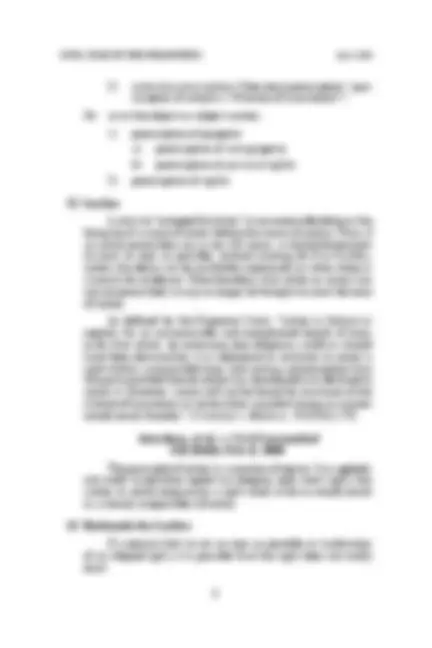
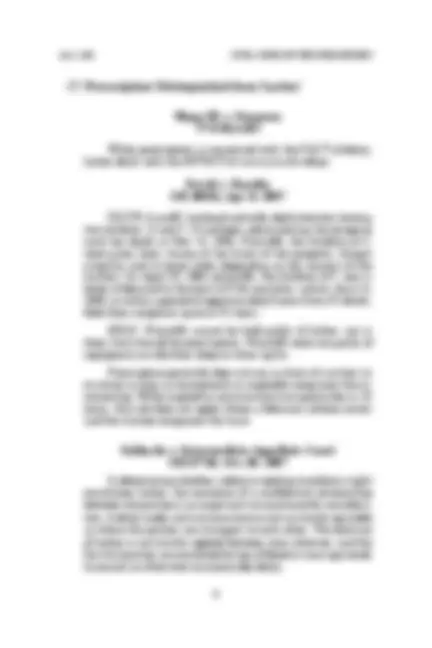
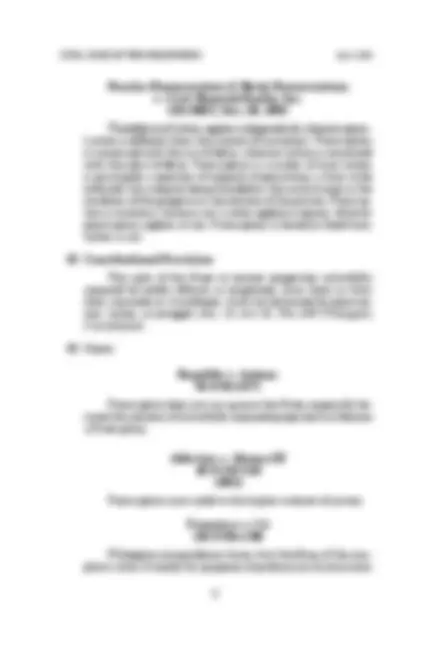
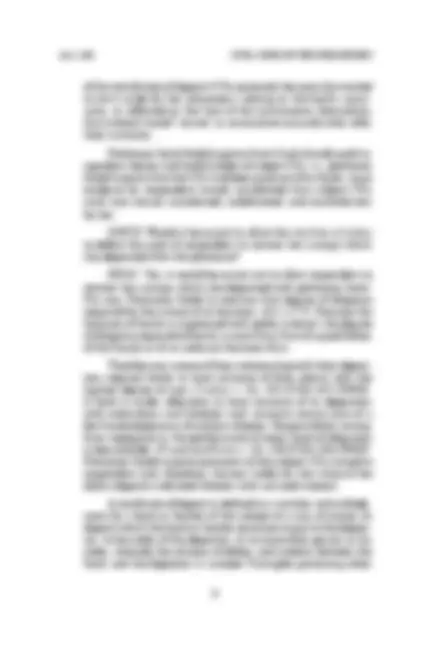
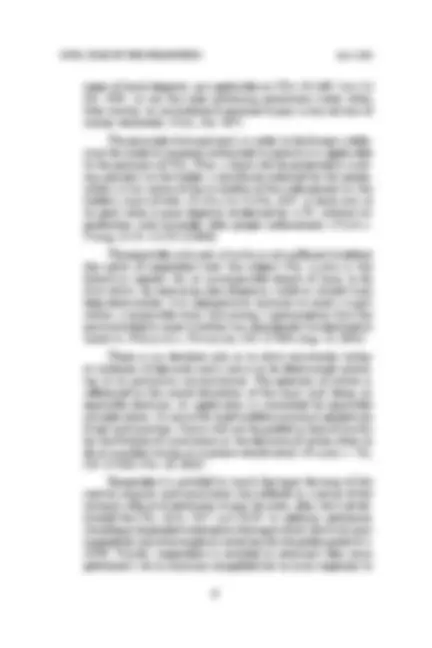
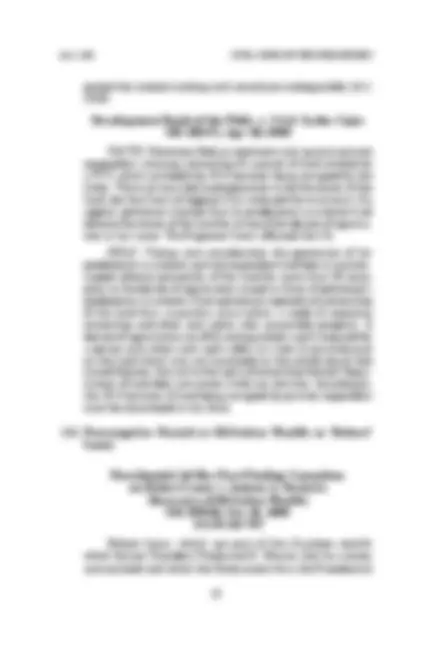
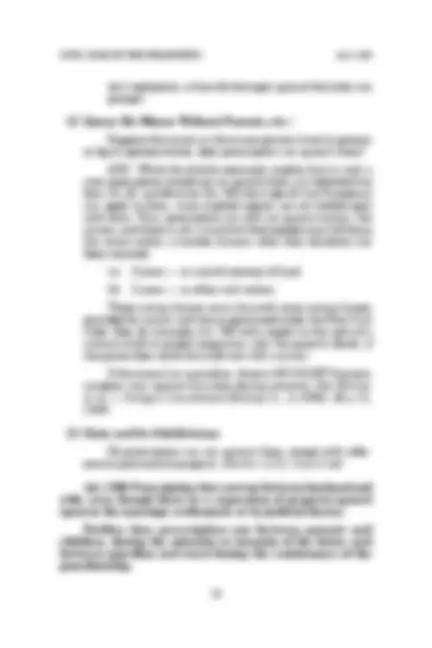
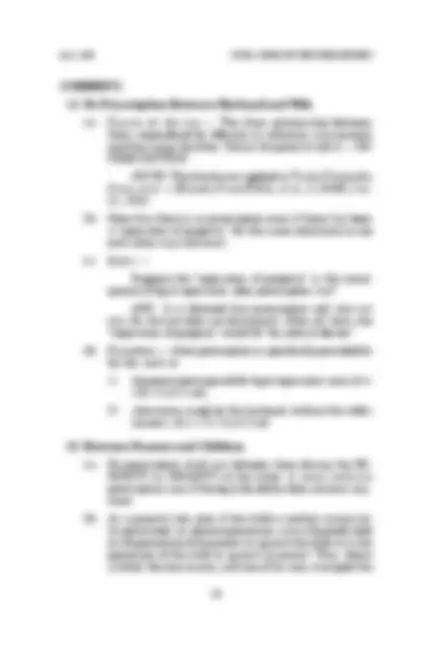
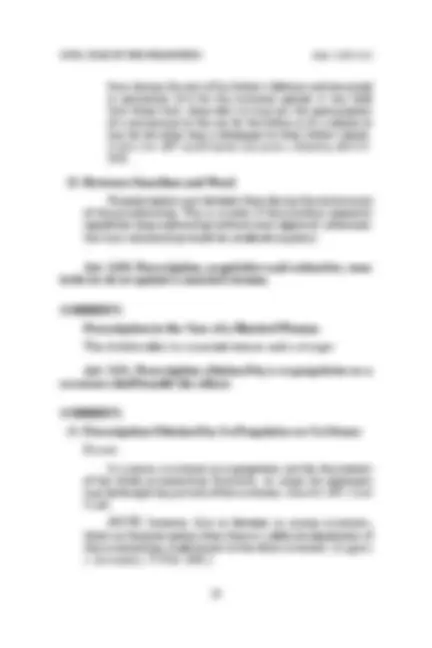
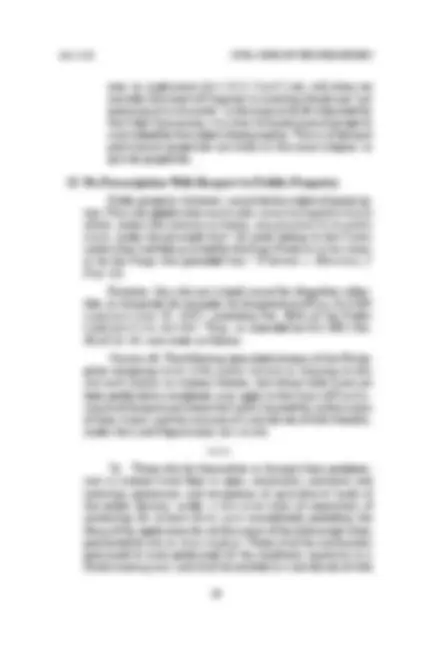
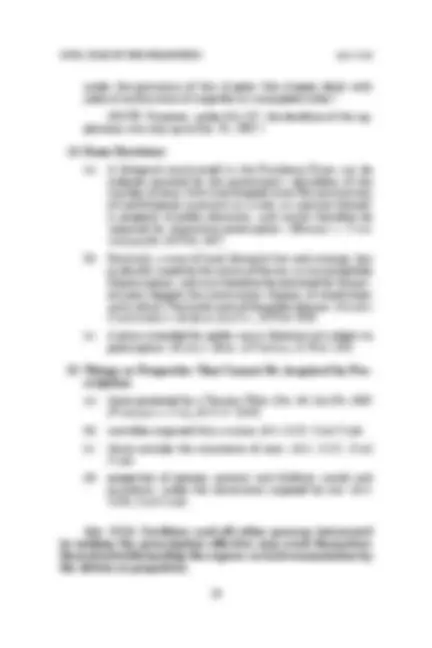
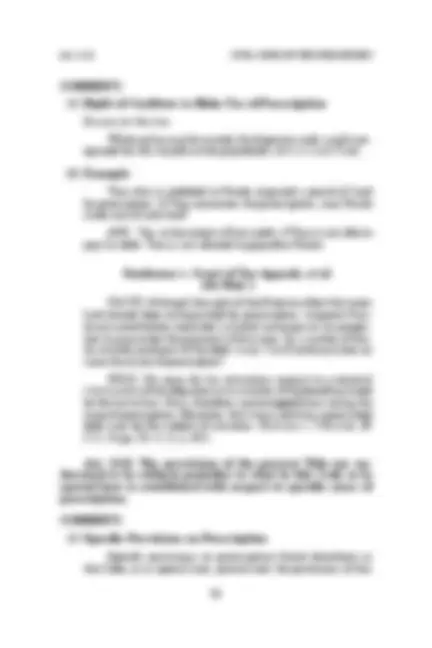
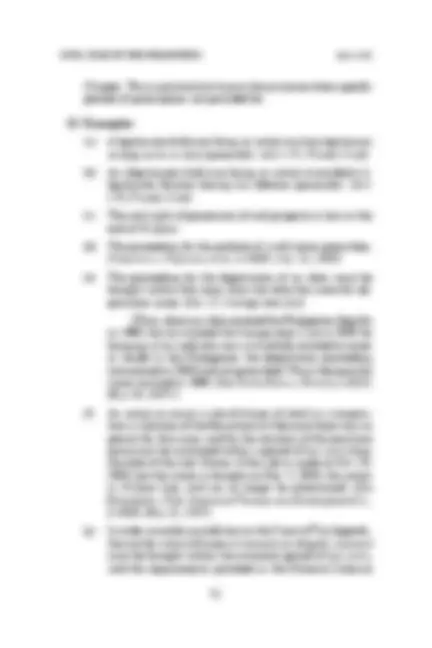
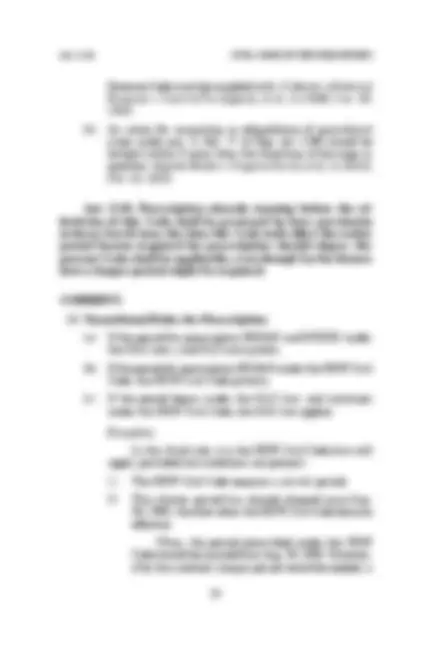
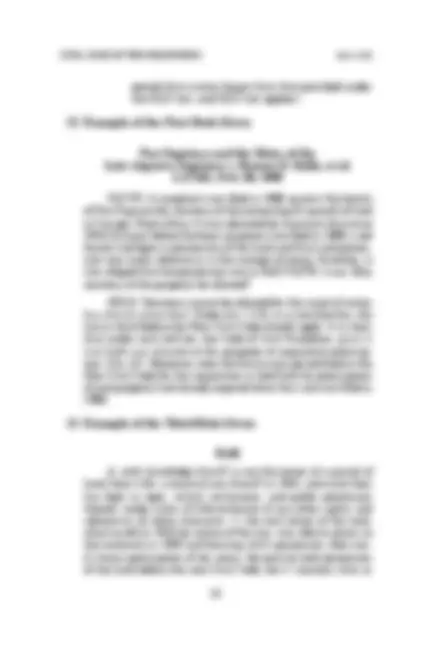
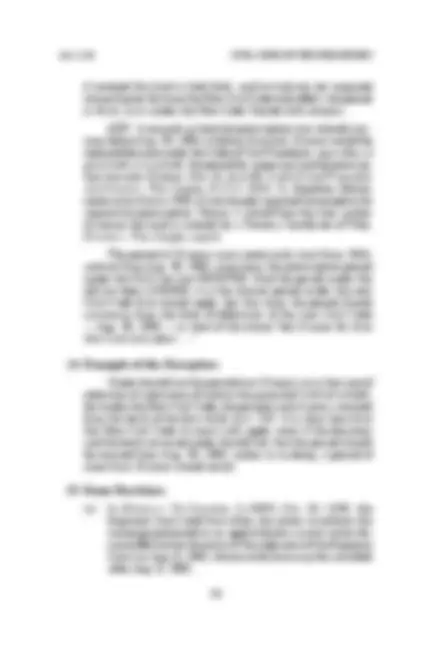
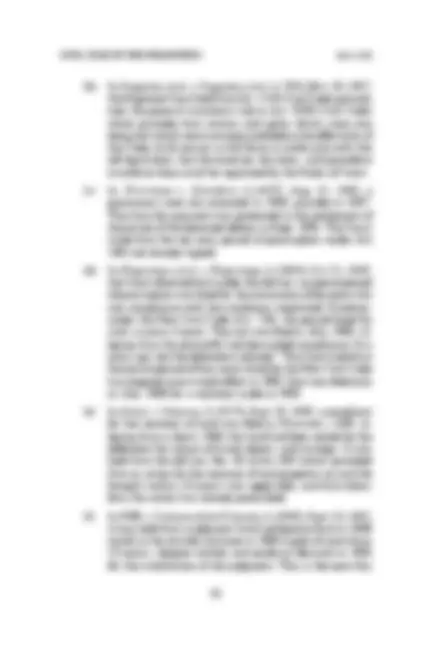

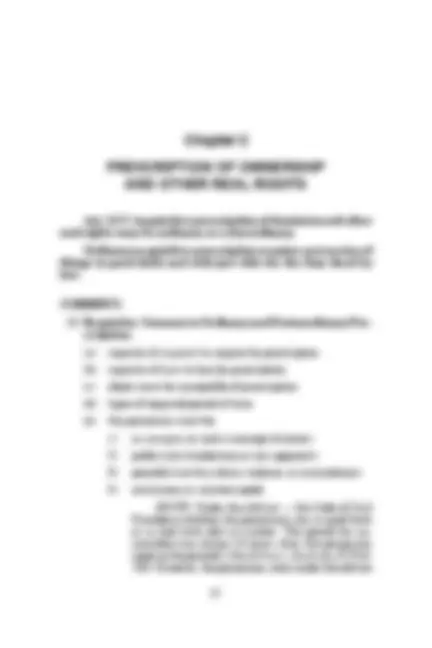
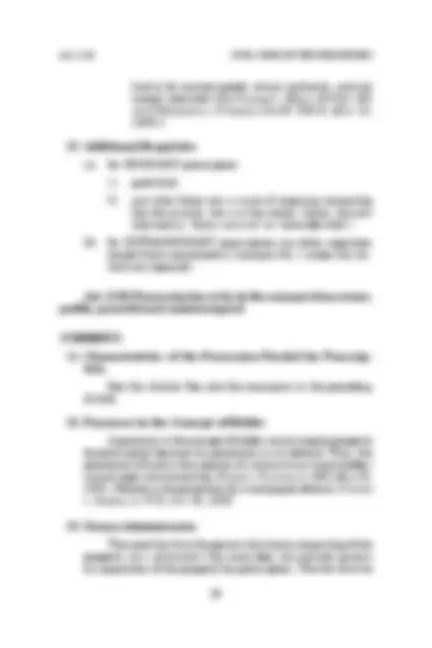
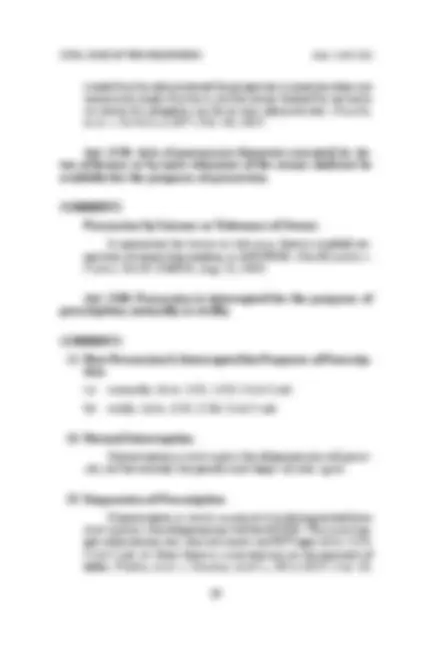
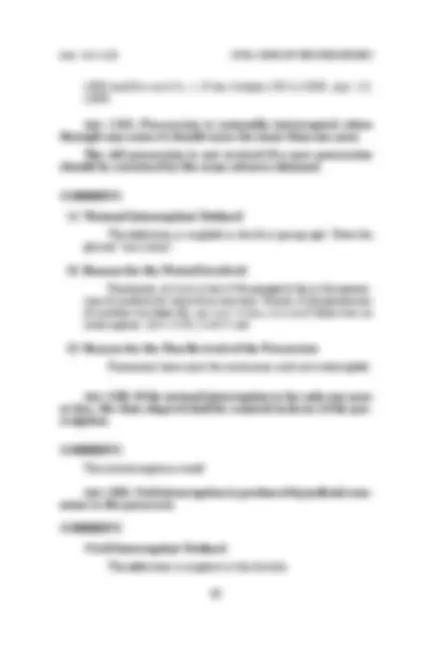
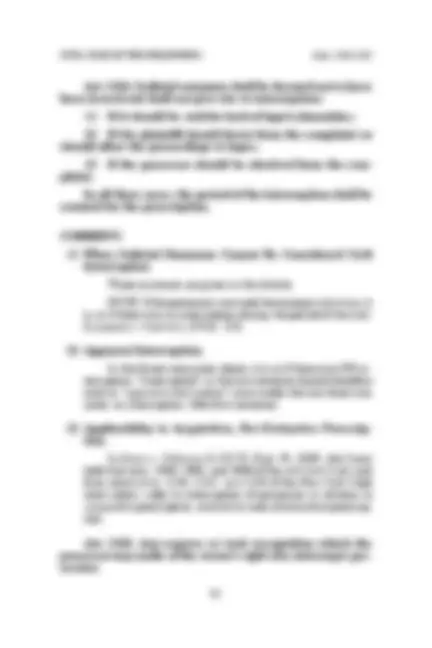
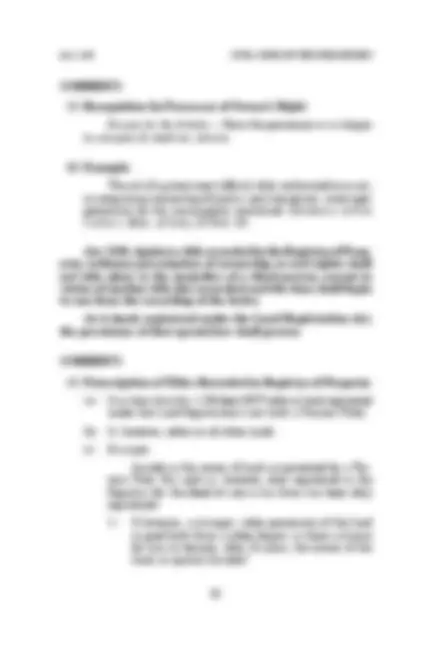
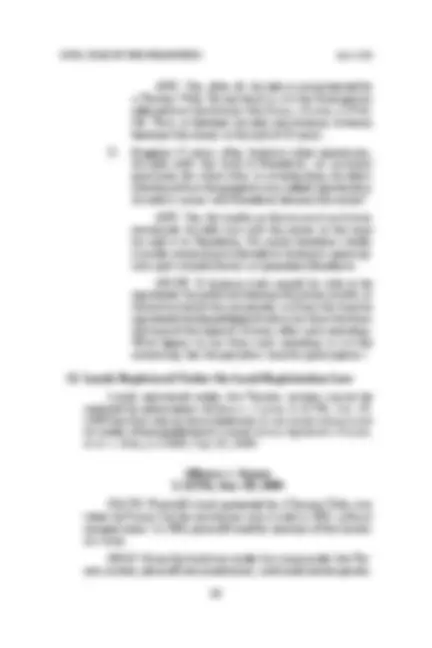
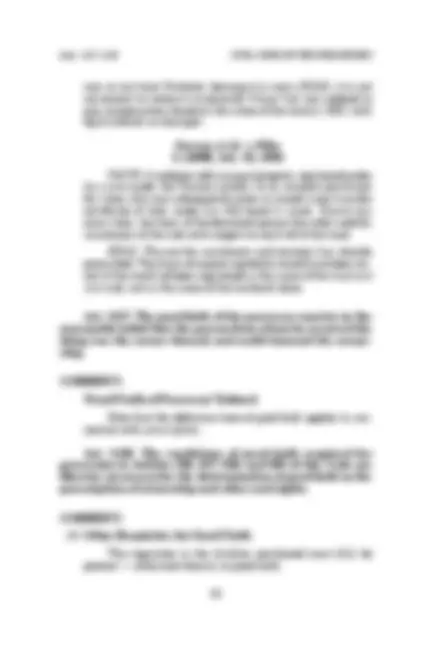
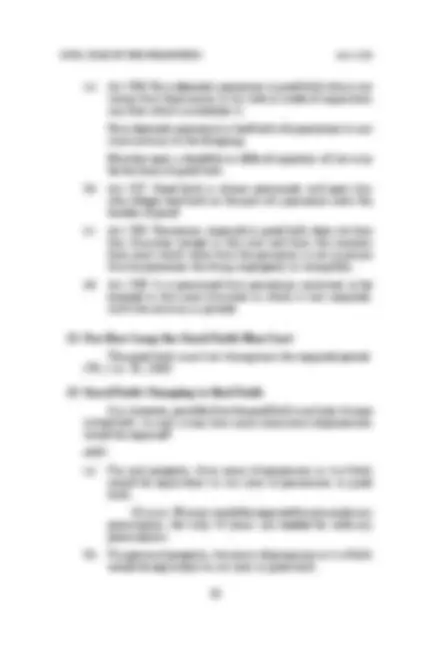
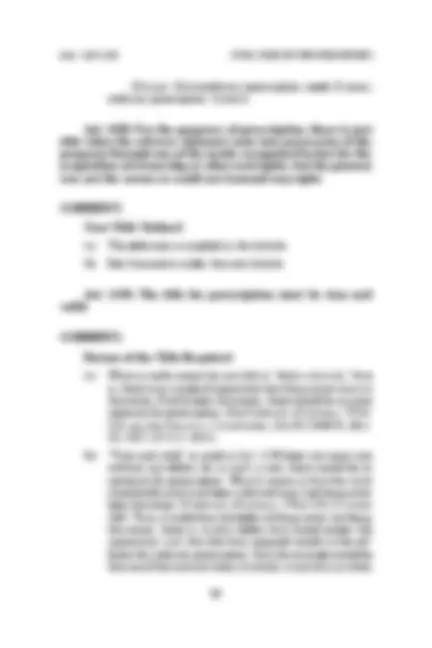
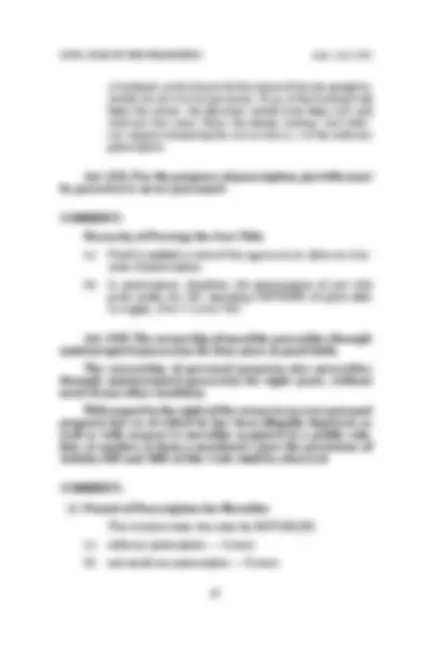
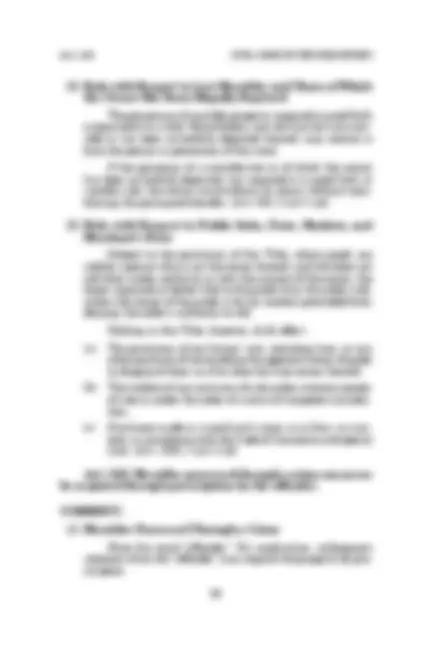
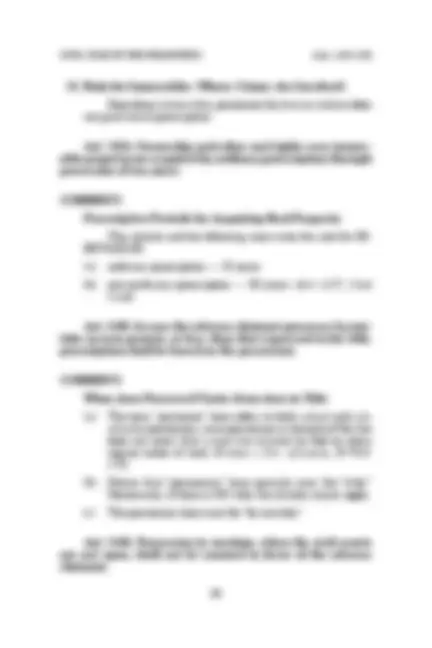
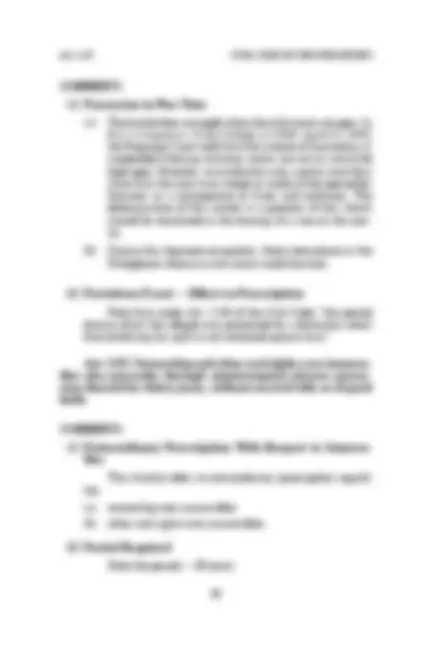
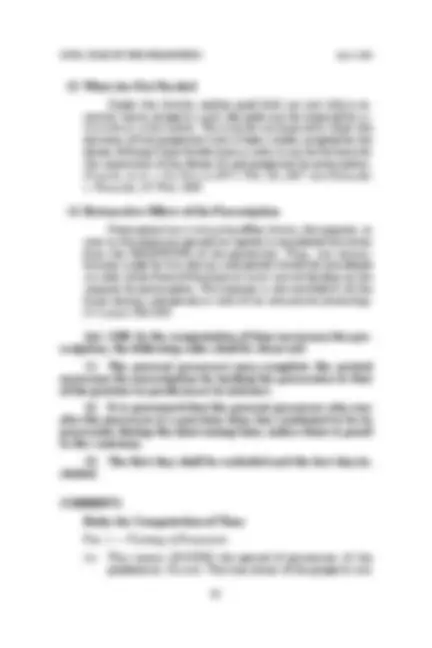
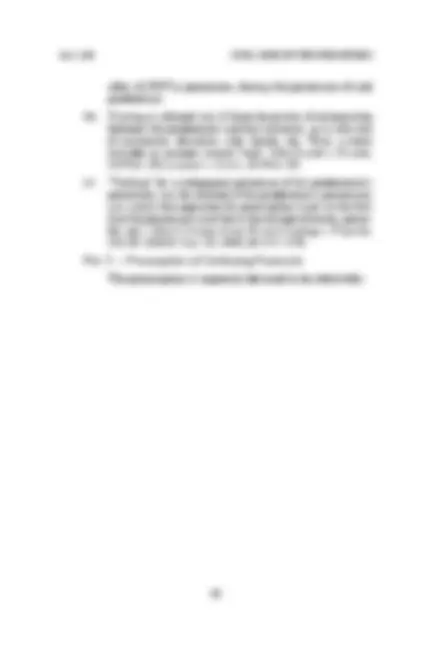
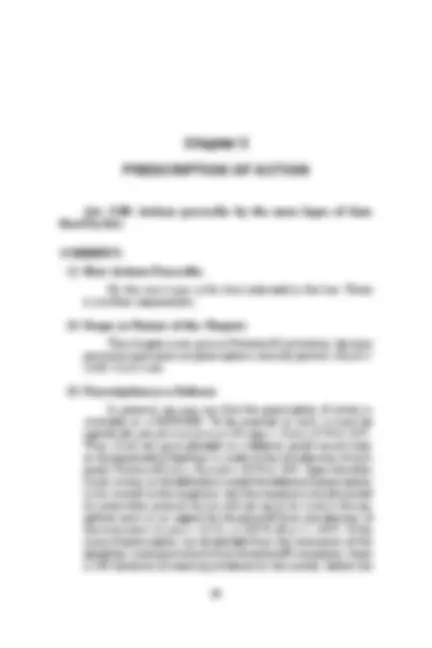
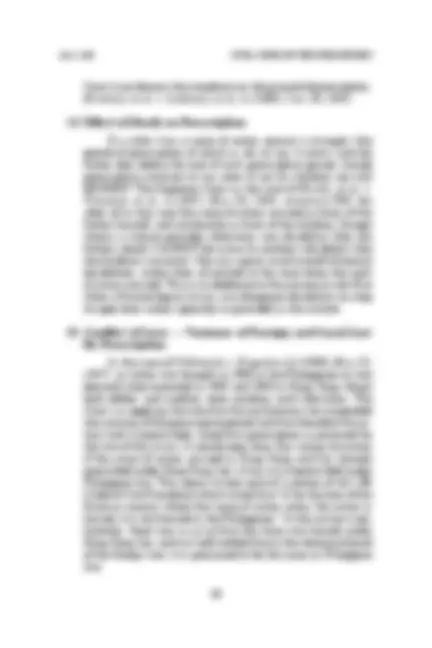
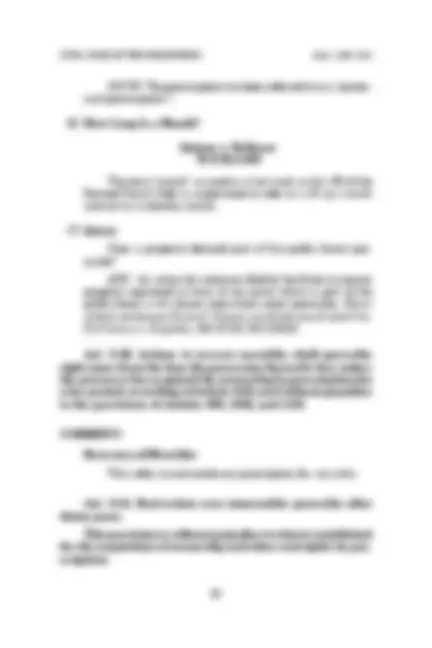
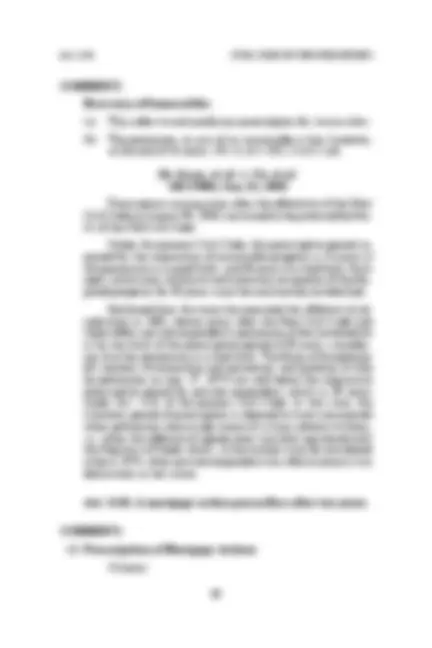
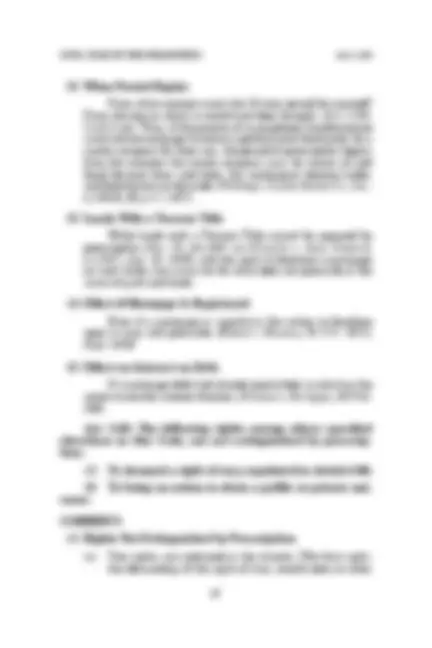
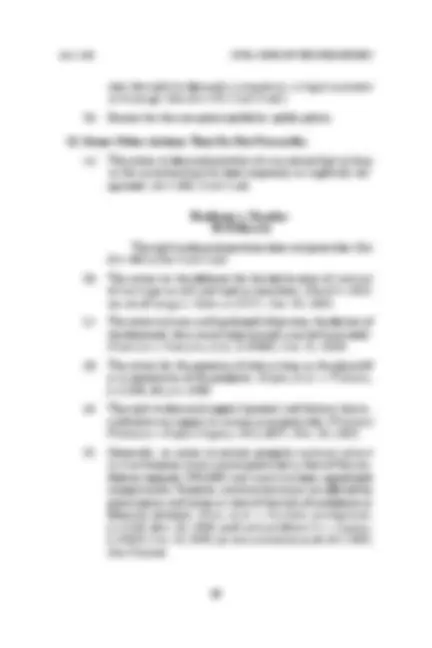
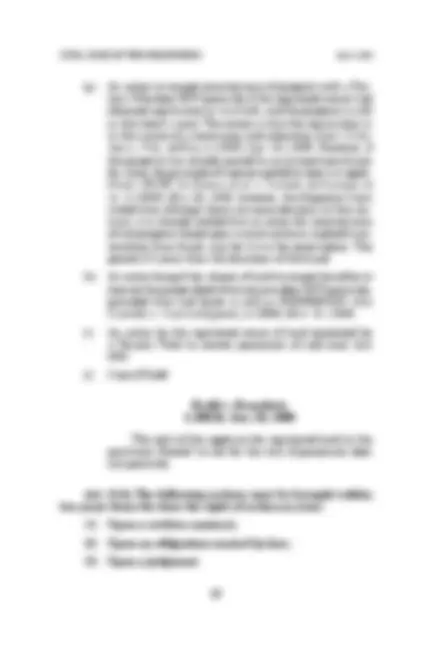
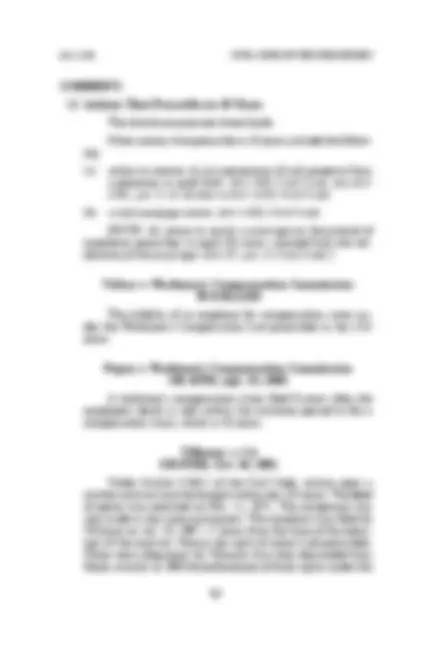
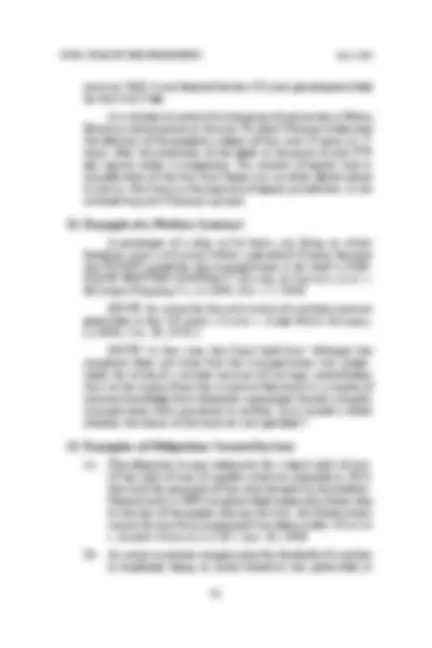
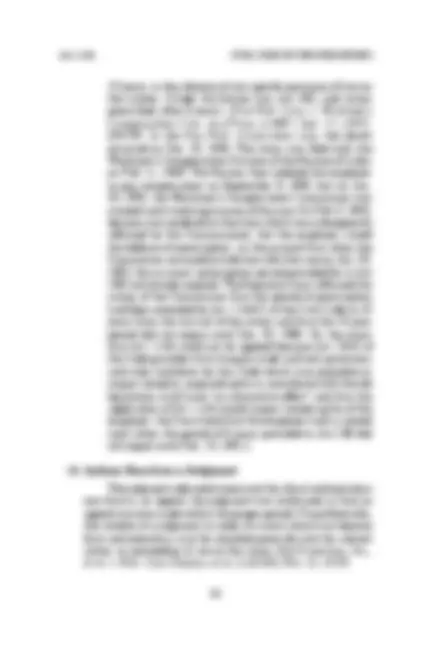
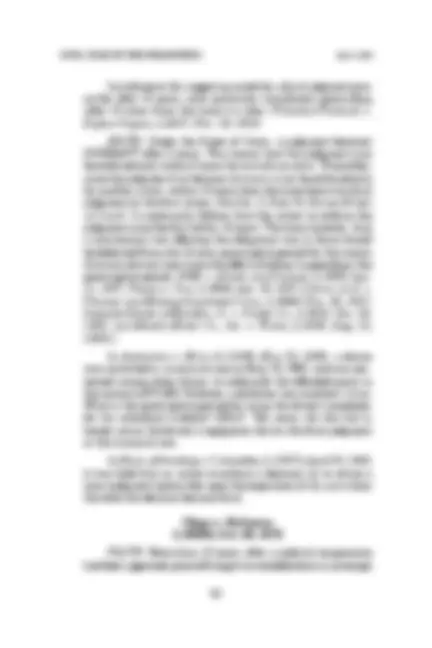
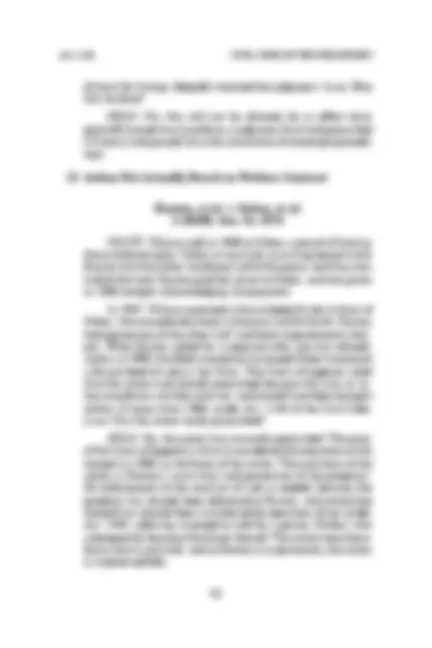
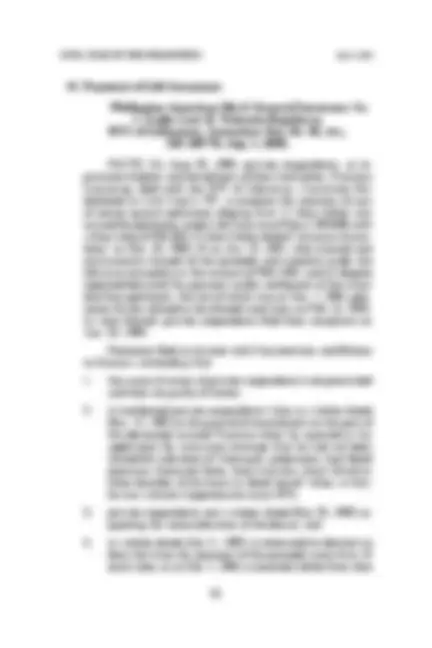
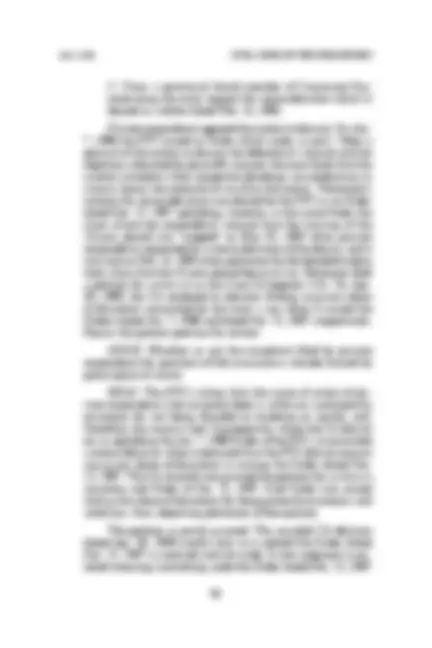
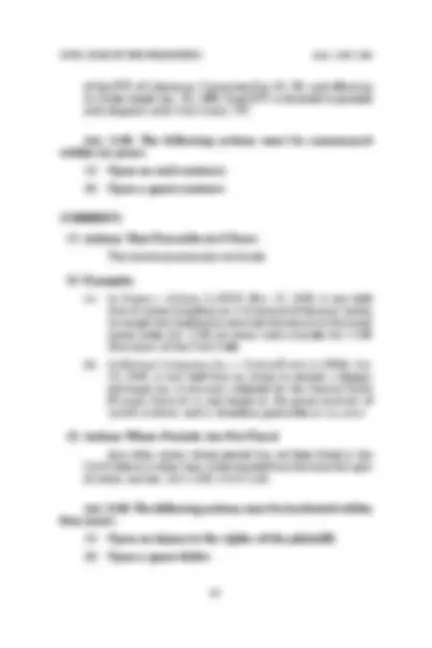
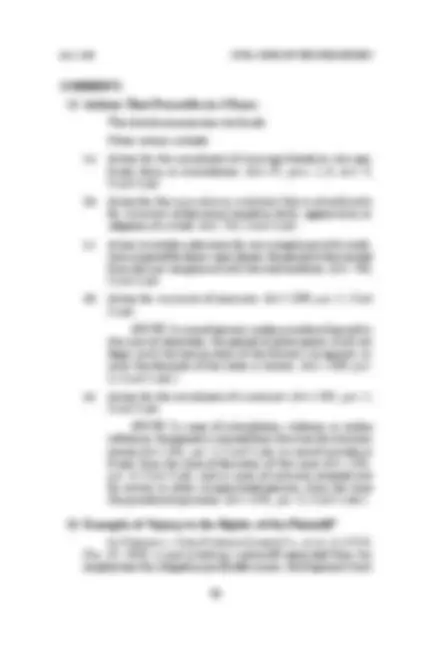
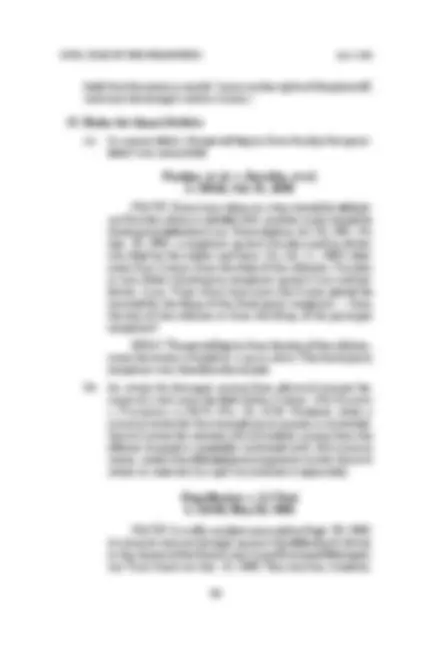
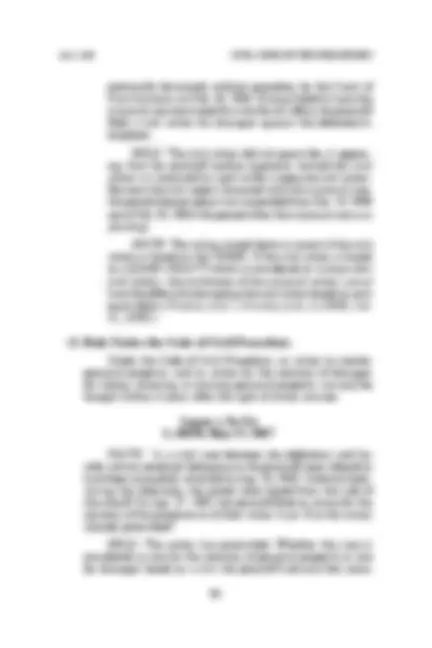
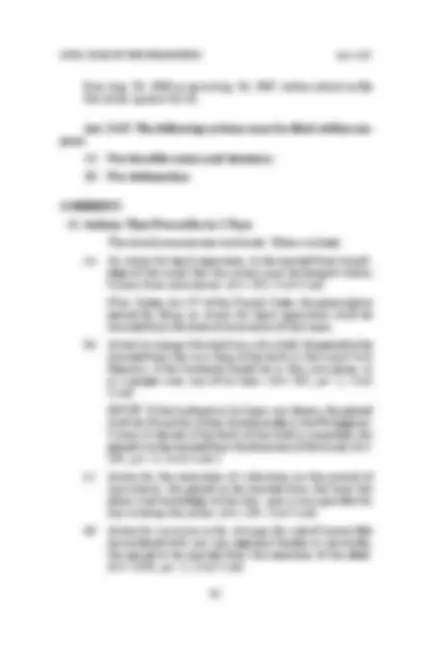
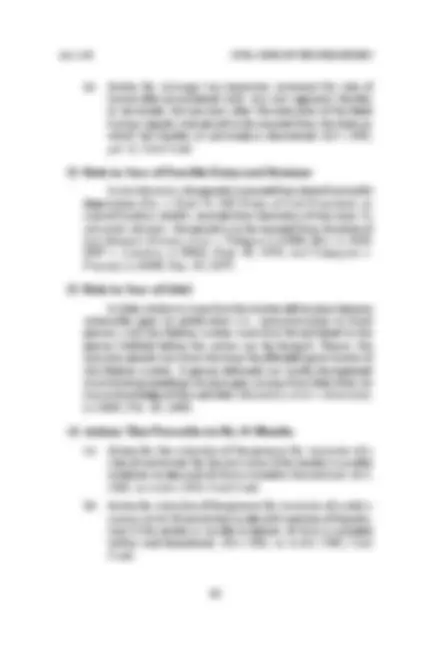
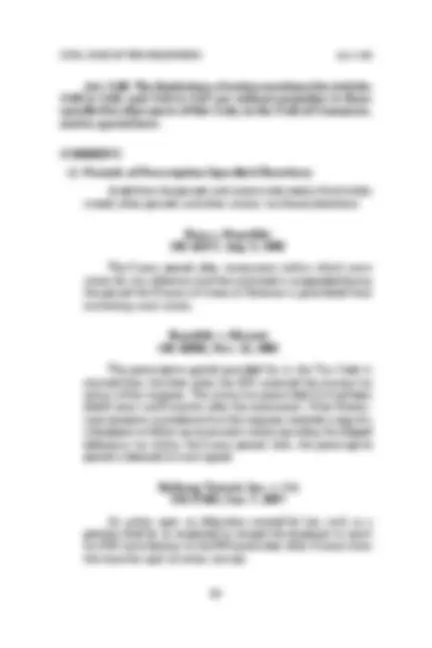
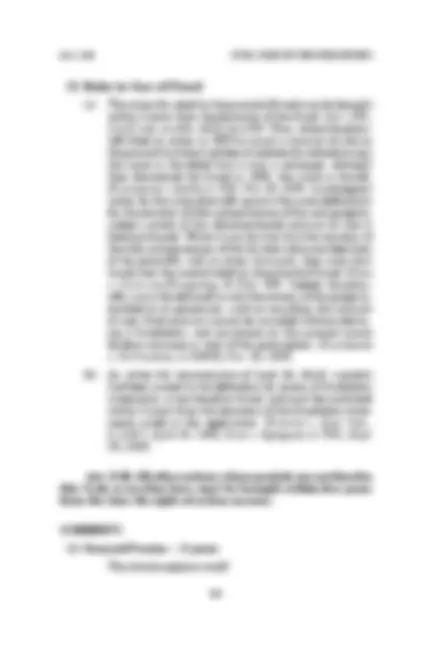
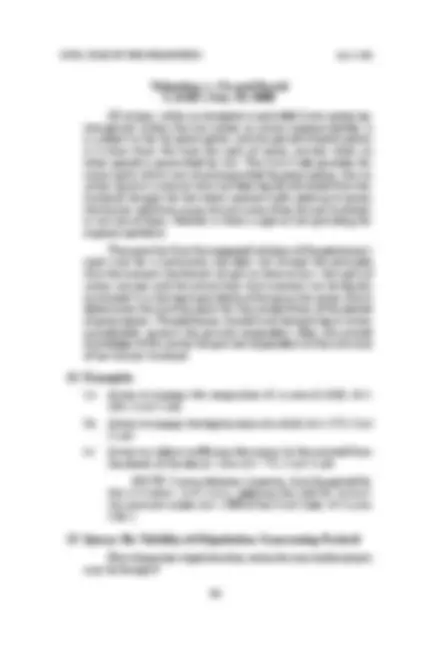
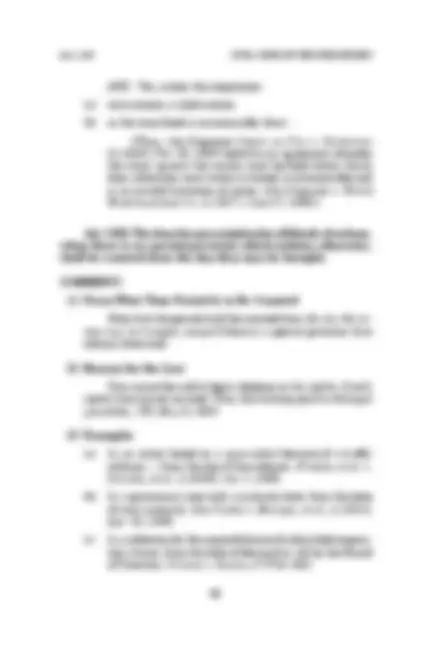
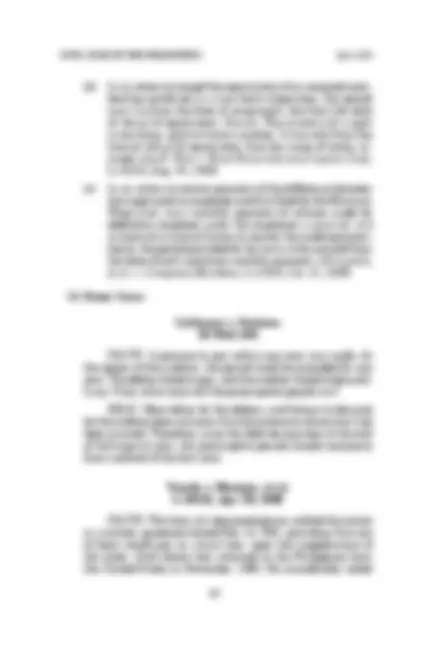
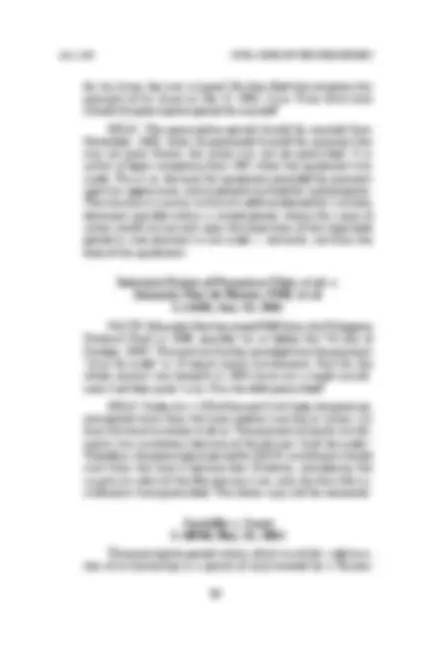
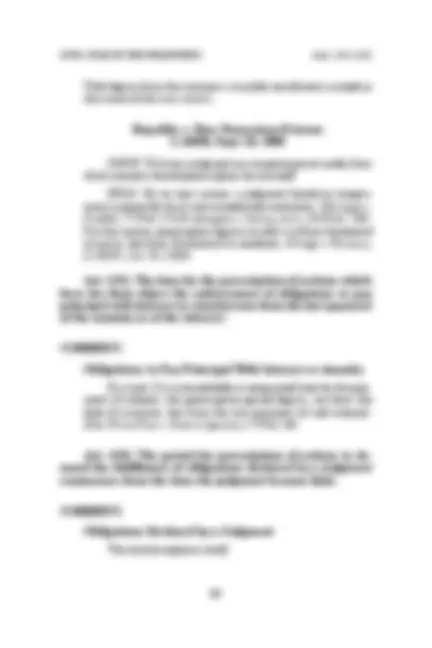
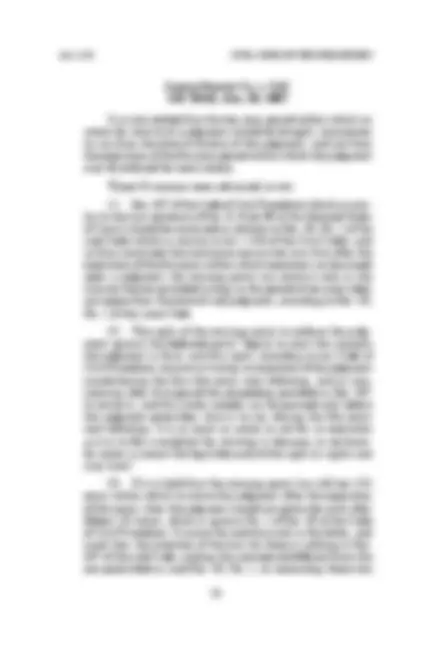
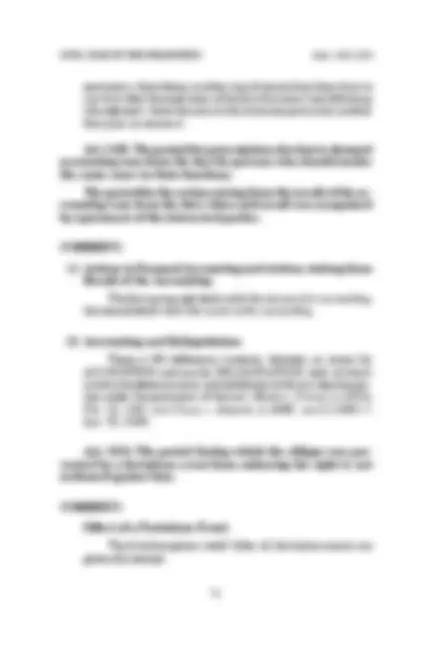
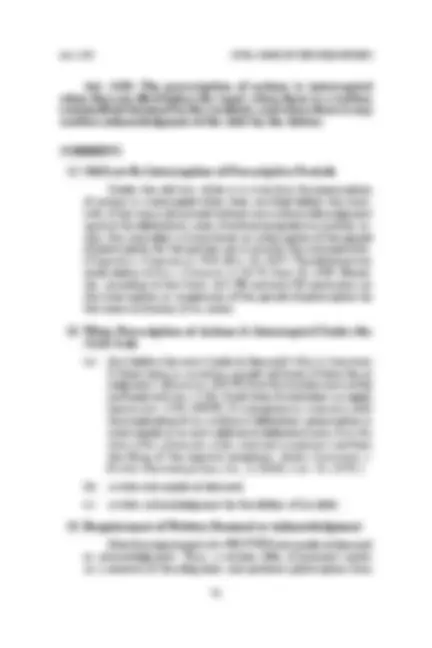
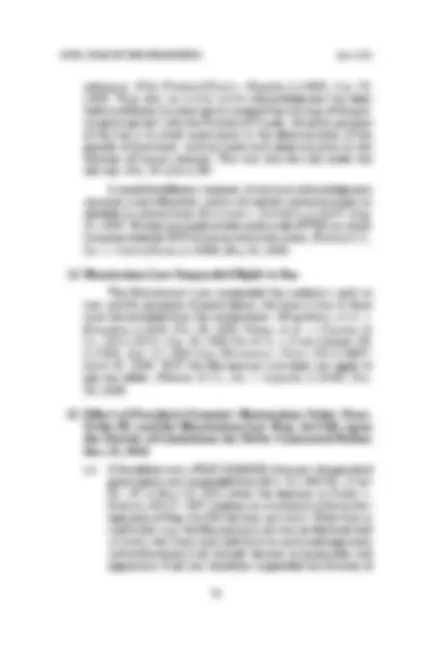
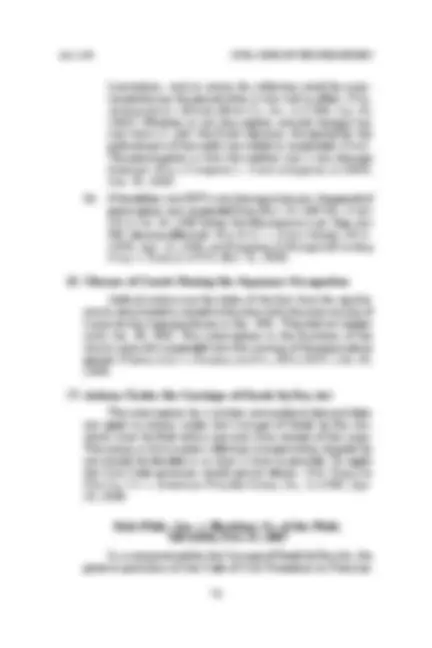
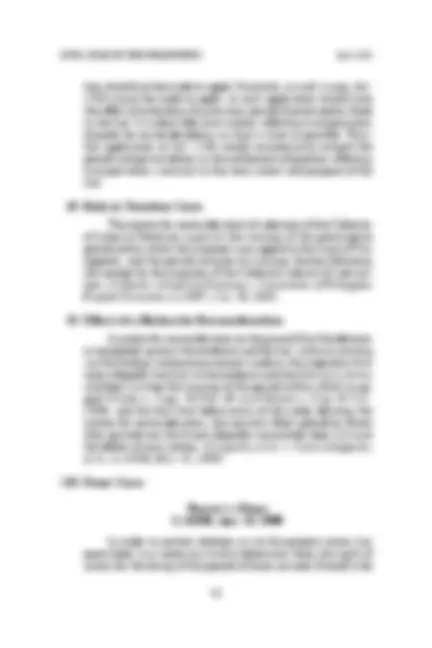
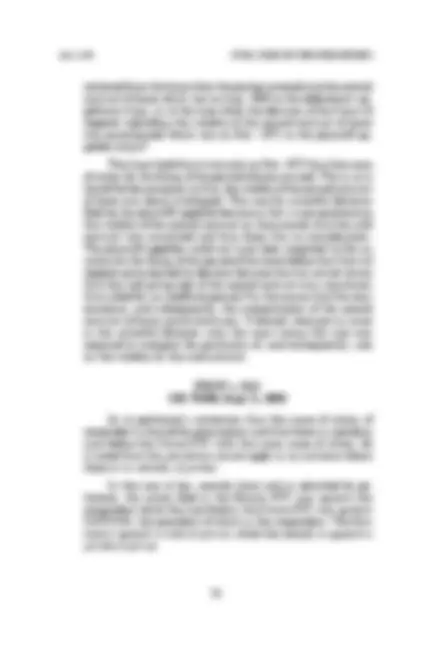
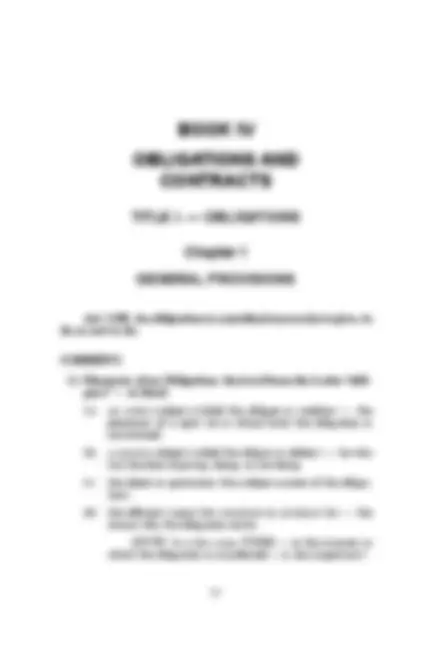
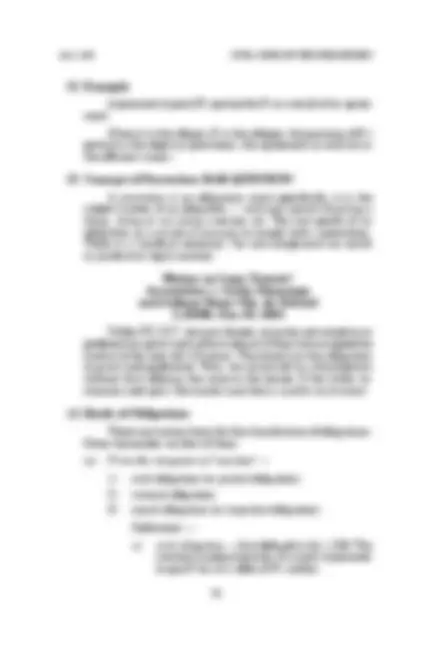
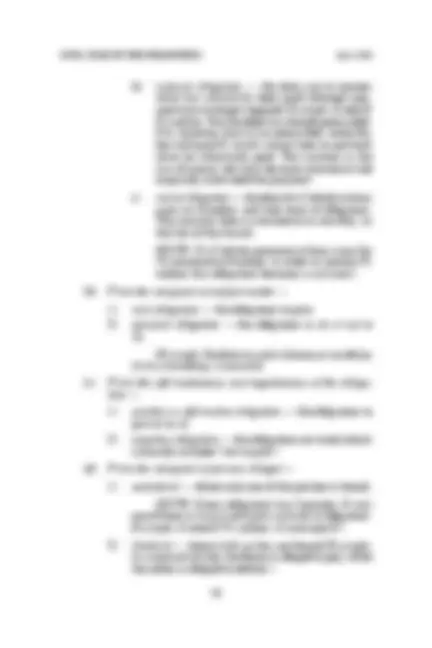
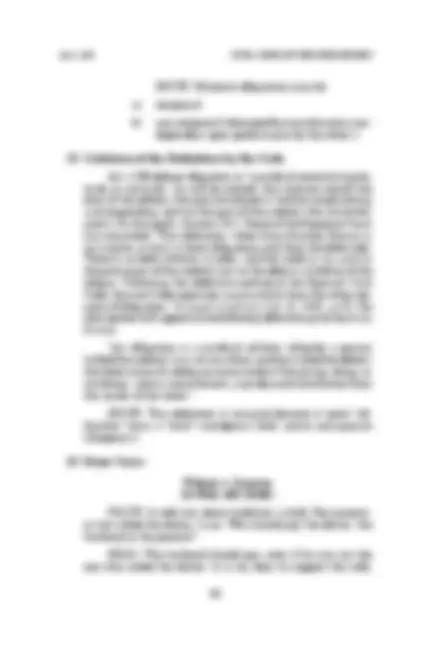
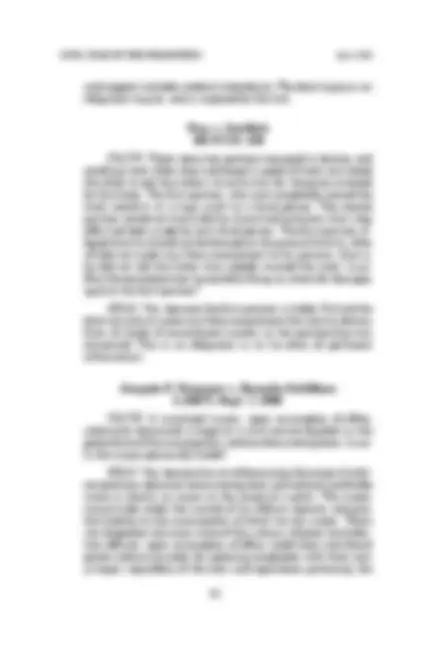
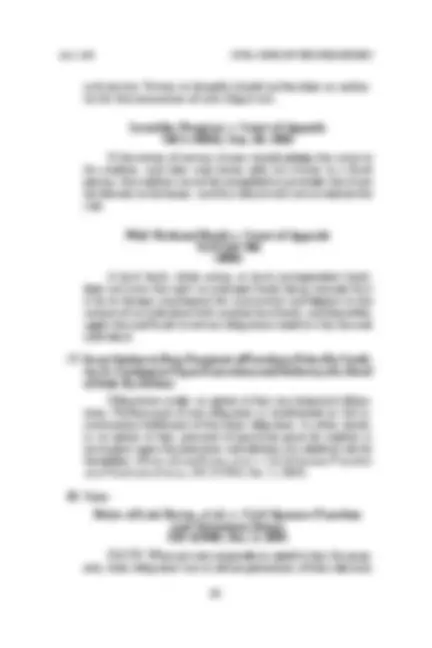
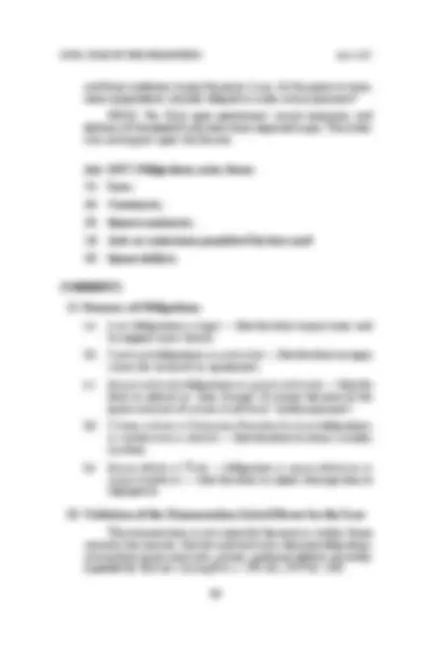
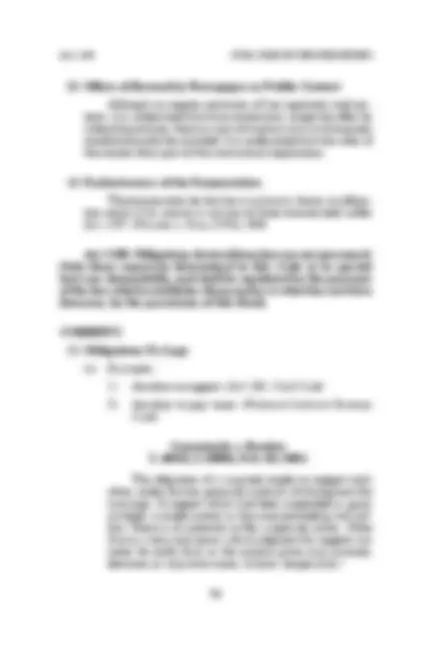
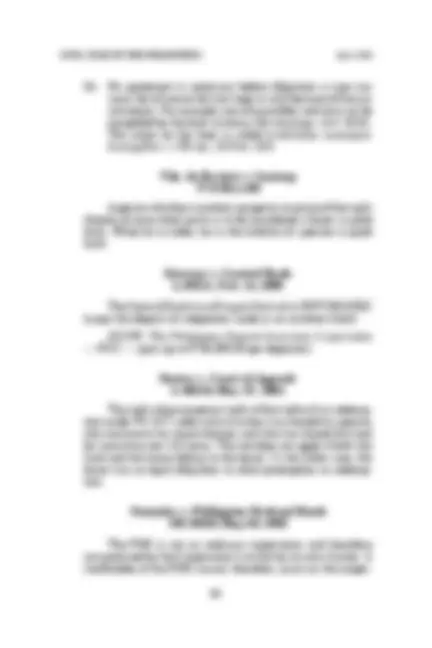
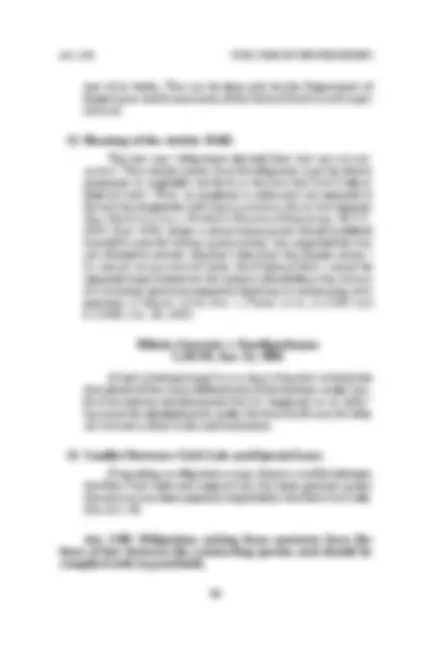
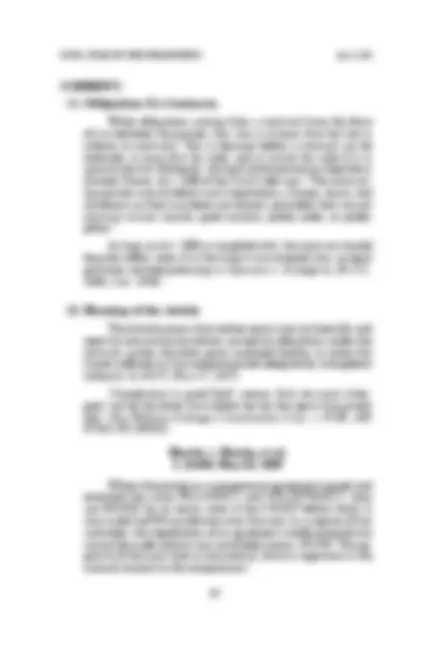
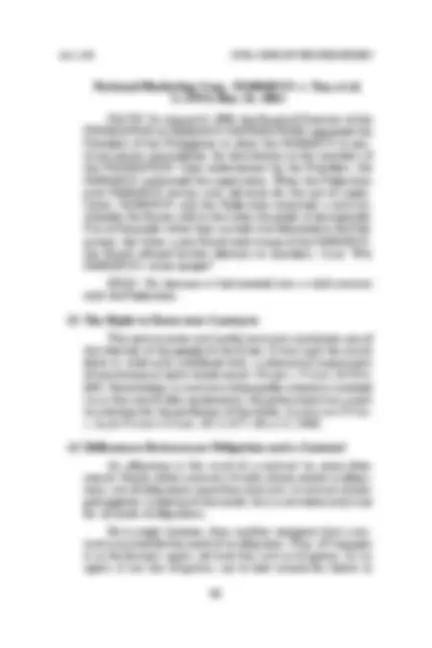
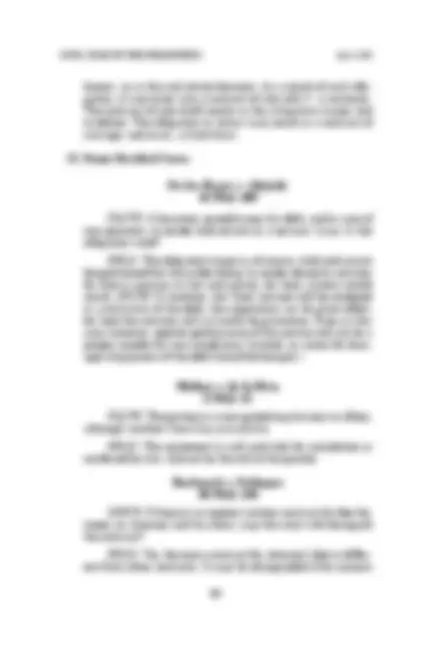
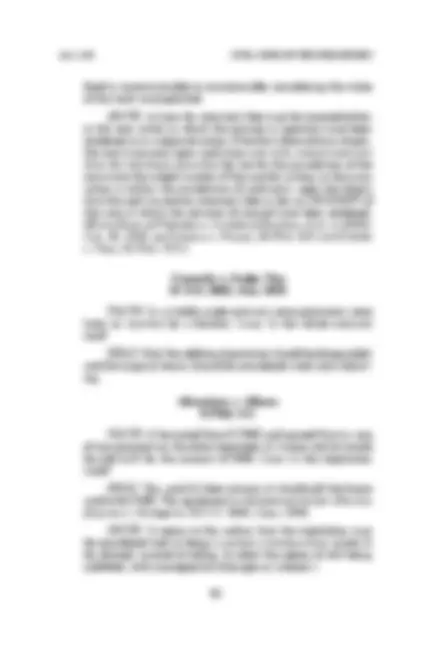
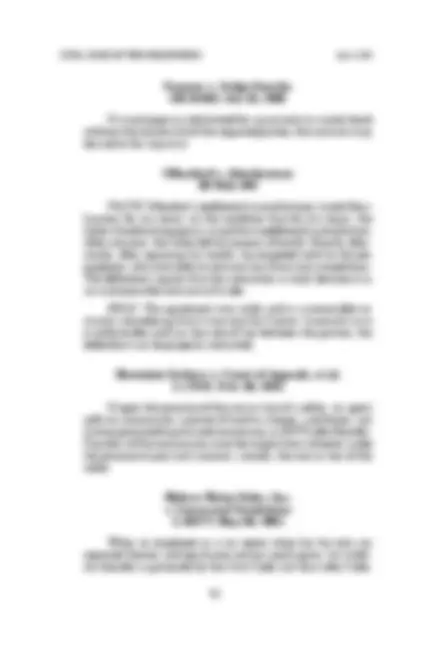
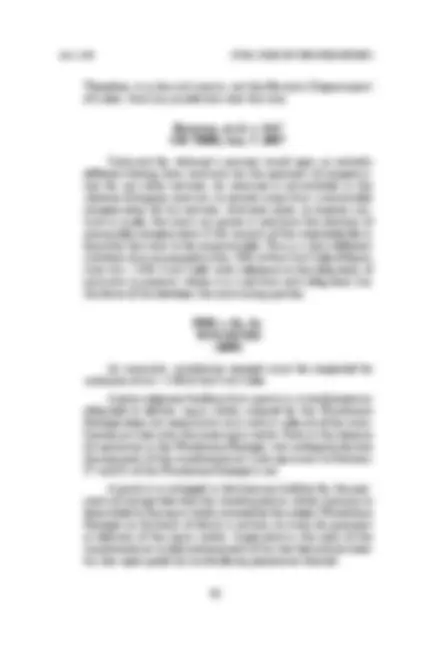
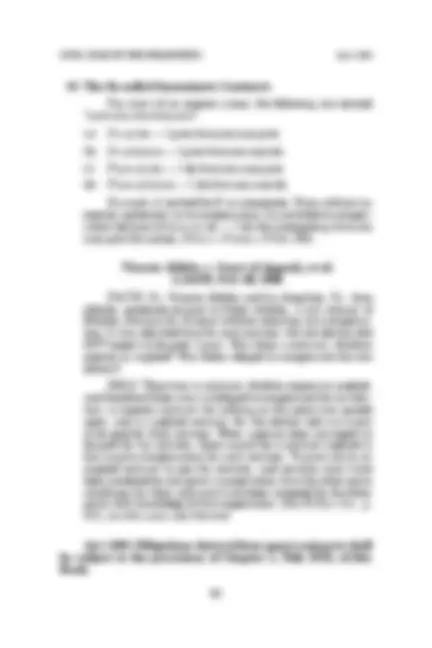
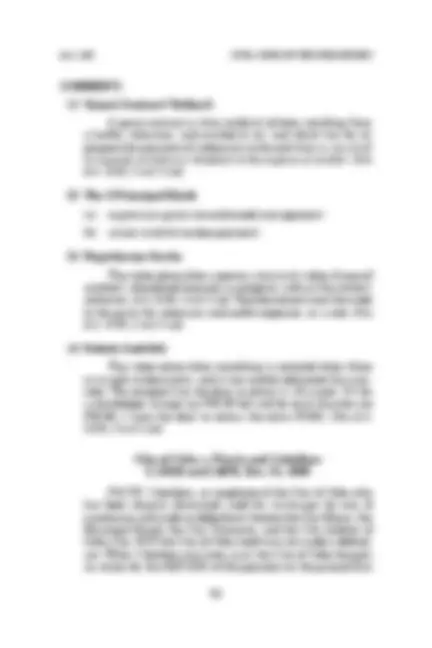
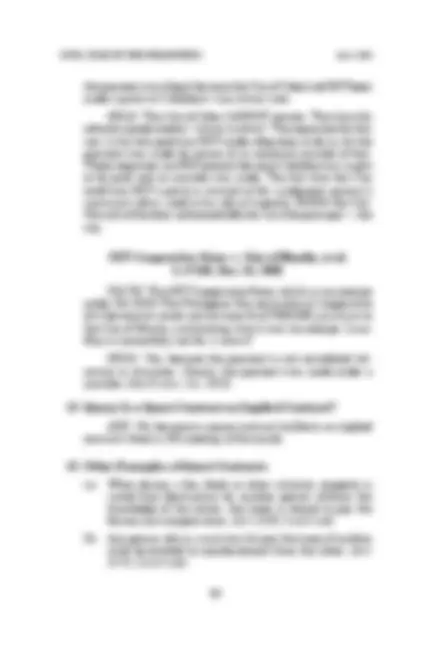
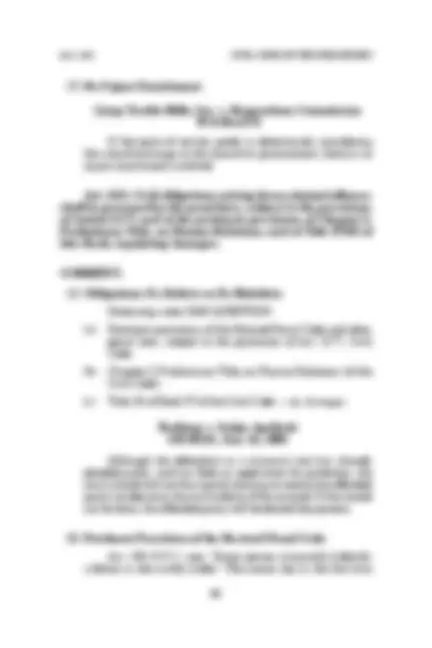
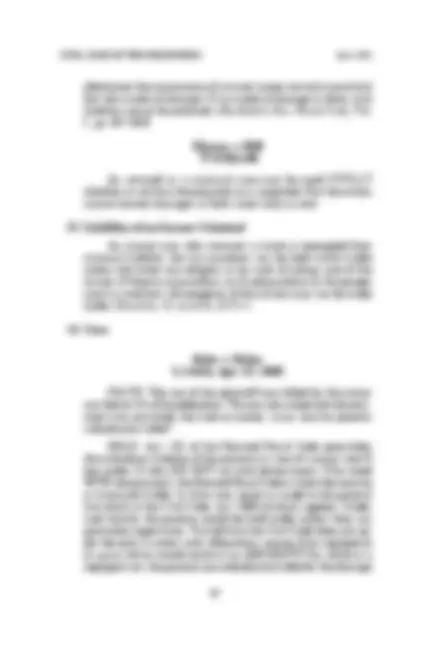
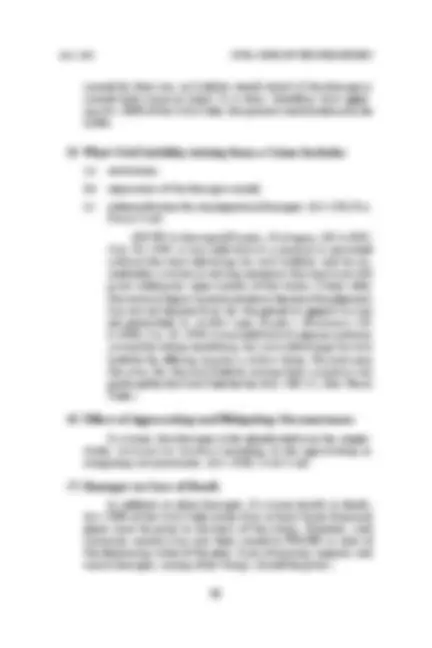
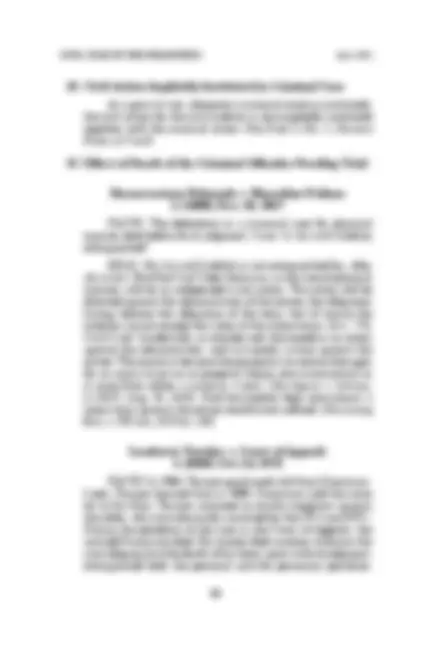
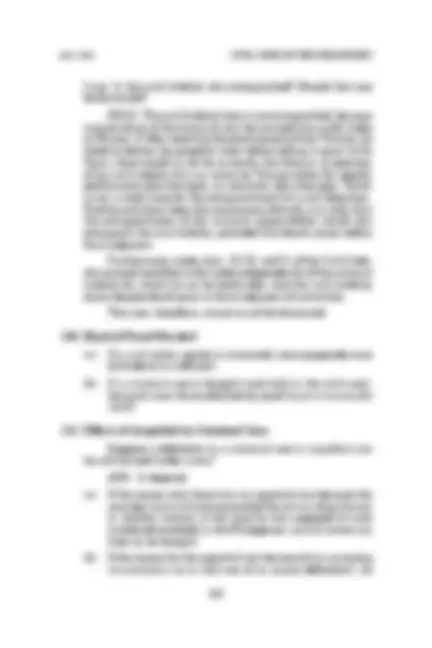


Study with the several resources on Docsity

Earn points by helping other students or get them with a premium plan


Prepare for your exams
Study with the several resources on Docsity

Earn points to download
Earn points by helping other students or get them with a premium plan
Community
Ask the community for help and clear up your study doubts
Discover the best universities in your country according to Docsity users
Free resources
Download our free guides on studying techniques, anxiety management strategies, and thesis advice from Docsity tutors
Coup up with the obligation and contract by Paras
Typology: Papers
1 / 1006

This page cannot be seen from the preview
Don't miss anything!





























































































CIVIL CODE OF THE PHILIPPINES
Article 1106. By prescription, one acquires ownership and other real rights through the lapse of time in the manner and under the conditions laid down by law.
In the same way, rights and actions are lost by prescrip- tion.
(1) Definition of Prescription Prescription is a mode of acquiring (or losing) ownership and other real rights thru the lapse of time in the manner and under the conditions laid down by law, namely, that the posses- sion should be: (a) in the concept of an owner
(b) public (c) peaceful
(d) uninterrupted. (Arts. 1106, 1118, Civil Code). (e) adverse. In order that a possession may really be adverse, the claimant must clearly, definitely, and unequivocally notify the owner of his (the claimant’s) intention to avert an exclusive ownership in himself. (Clendenin v. Clendenin, 181 N.C. 465 and Director of Lands v. Abiertas, CA-GR 91-R, Mar. 13, 1947, 44 O.G. 923).
(2) Proof Needed
Because prescription is an extraordinary mode of acquiring ownership, all the essential ingredients, particularly the period of time, must be shown clearly. (Boyo v. Makabenta, CA-GR 7941-R, Nov. 24, 1952).
(3) Reasons or Bases for Prescription
(a) Economic necessity (otherwise, property rights would re- main unstable).
Director of Lands, et al. v. Funtillar, et al. GR 68533, May 23, 1986
FACTS: Where the land sought to be registered was declared alienable and disposable 33 years ago, and is no longer a forest land, and the same has been possessed and cultivated by the applicants and their predecessors for at least three generations. HELD: The attempts of humble people to have disposable lands they have been tilling for generations titled in their names should not only be viewed with an understanding attitude but should, as a matter of policy, be encouraged. (b) Freedom from judicial harassment (occasioned by claims without basis). (c) Convenience in procedural matters (in certain instances, juridical proof is dispensed with). (d) Presumed abandonment or waiver (in view of the owner’s indifference or inaction).
(4) Classification of Prescription
(a) as to whether rights are acquired or lost:
b) extraordinary prescription
(7) ‘Prescription’ Distinguished from ‘Laches’
Mapa III v. Guanzon 77 SCRA 387
While prescription is concerned with the FACT of delay, laches deals with the EFFECT of unreasonable delay.
David v. Bandin GR 48322, Apr. 8, 1987
FACTS: A and B , husband and wife, died intestate, leaving two children, X and Y. X had been administering the property until her death in Feb. 15, 1955. Plaintiffs, the children of Y, were given their shares of the fruits of the property, though irregular and at times little, depending on the amount of the harvest. On April 23, 1963, plaintiffs, the children of Y, sent a letter of demand to the heirs of X for partition, and on June 14, 1963, or within a period of approximately 8 years from X’s death, fi led their complaint against X’s heirs. HELD: Plaintiffs cannot be held guilty of laches, nor is their claim barred by prescription. Plaintiffs were not guilty of negligence nor did they sleep on their rights. Prescription generally does not run in favor of a co-heir or co-owner as long as he expressly or impliedly recognizes the co- ownership. While implied or constructive trust prescribes in 10 years, the rule does not apply where a fiduciary relation exists and the trustee recognizes the trust.
Gallardo v. Intermediate Appellate Court GR 67742, Oct. 29, 1987 In determining whether a delay in seeking to enforce a right constitutes laches, the existence of a confidential relationship between the parties is an important circumstance for considera- tion. A delay under such circumstance is not as strictly regarded as where the parties are strangers to each other. The doctrine of laches is not strictly applied between near relatives, and the fact that parties are connected by ties of blood or marriage tends to excuse an otherwise unreasonable delay.
Narciso Buenaventura & Maria Buenaventura v. CA & Manotok Realty, Inc. GR 50837, Dec. 28, 1992 The defense of laches applies independently of prescription. Laches is different from the statute of limitations. Prescription is concerned with the fact of delay, whereas laches is concerned with the effect of delay. Prescription is a matter of time; laches is principally a question of inequity of permitting a claim to be enforced, this inequity being founded on the same change in the condition of the property or the relation of the parties. Prescrip- tion is statutory; laches is not. Laches applies in equity, whereas prescription applies at law. Prescription is based on fixed time; laches is not.
(8) Constitutional Provision
The right of the State to recover properties unlawfully acquired by public officials or employees, from them or from their nominees or transferees, shall not be barred by prescrip- tion, laches, or estoppel. (Sec. 15, Art. XI, The 1987 Philippine Constitution).
(9) Cases
Republic v. Animas 56 SCRA 871 Prescription does not run against the State, especially be- cause the recovery of unlawfully acquired properties has become a State policy.
Aldovino v. Alunan III 49 SCAD 340 (1994) Prescription must yield to the higher interest of justice.
Francisco v. CA 122 SCRA 538 Philippine jurisprudence shows that the filing of the com- plaint, even if merely for purposes of preliminary examination
Sec. 47 of PD 1529) to the effect that no title to registered land in derogation to that of a registered owner shall be acquired by prescription or adverse possession. (J.M. Tuason & Co. v. Aquirre, 7 SCRA 109 [1963]).
In fact, there is a host of jurisprudence that hold that pre- scription and laches could not apply to registered land covered by the Torrens system. (Bishop v. CA, 208 SCRA 636 [1992] and St. Peter Memorial Park, Inc. v. Cleofas, supra). With more reason are these principles applicable to laches, which is an equitable principle. Laches may not prevail against a specific provision of law, since equity , which has been defi ned as “justice outside le- gality” is applied in the obscene of and not against statutory law or rules of procedure. (Causapin v. CA, 233 SCRA 615 [1994]).
Upon the other hand, the heirs of the registered owner are not estopped from claiming their father’s property, since they merely stepped into the shoes of the previous owners. Prescrip- tion is unavailing not only against the registered owner, but also against his hereditary successors because the latter merely step into the shoes of the decedent by operation of law and are merely the continuation of the personality of their predecessor- in-interest. (Teofila de Guinoo v. CA [97 Phil. 235] and Gil Atun v. Eusebio Nuñez [97 Phil. 762]).
The CA erred in ordering the Register of Deeds to cancel OCT 206 of Claro Mateo and issue new titles to those who are occupying the subject land. This violates the indefeasibility of a Torrens title. The title of Claro Mateo could be cancelled only if there is competent proof that he had transferred his rights over the parcel of land to another party, otherwise title would pass to his heirs only by testate or intestate succession.
The fallo: The Supreme Court thereupon reverses the CA’s decision. In lieu thereof, the Court remands the case to the trial court for determination of the heirs of Claro Mateo in a proper proceeding.
Far East Bank & Trust Co. v. Estrella O. Querimit GR 148582, Jan. 16, 2002
FACTS: Respondent deposited her savings with petitioner- bank. She did not withdraw her deposit even after maturity date
of the certificates of deposit (CDs) precisely because she wanted to set it aside for her retirement, relying on the bank’s assur- ance, as refl ected on the face of the instruments themselves, that interest would “accrue” or accumulate annually even after their maturity.
Petitioner-bank failed to prove that it had already paid re- spondent, bearer and lawful holder of subject CDs, i.e., petitioner failed to prove that the CDs had been paid out of its funds, since evidence by respondent stands unrebutted that subject CDs until now remain unindorsed, undelivered, and unwithdrawn by her.
ISSUE: Would it be unjust to allow the doctrine of laches to defeat the right of respondent to recover her savings which she deposited with the petitioner?
HELD: Yes, it would be unjust not to allow respondent to recover her savings which she deposited with petitioner-bank. For one, Petitioner failed to exercise that degree of diligence required by the nature of its business. (Art. 1173). Because the business of banks is impressed with public interest, the degree of diligence required of banks is more than that of a good father of the family or of an ordinary business firm.
The fiduciary nature of their relationship with their deposi- tors requires banks to treat accounts of their clients with the highest degree of care. (Canlas v. CA, 326 SCRA 415 [2000]). A bank is under obligation to treat accounts of its depositors with meticulous care whether such accounts consist only of a few hundred pesos or of millions of pesos. Responsibility arising from negligence in the performance of every kind of obligation is demandable. (Prudential Bank v. CA, 328 SCRA 264 [2000]). Petitioner failed to prove payment of the subject CDs issued to respondent and, therefore, remains liable for the value of the dollar deposits indicated thereon with accrued interest.
A certifi cate of deposit is defined as a written acknowledg- ment by a bank or banker of the receipt of a sum of money on deposit which the bank or banker promises to pay to the deposi- tor, to the order of the depositor, or to some other person or his order, whereby the relation of debtor and creditor between the bank and the depositor is created. Principles governing other
protect her interest making such award just and equitable. (Art. 2208).
Development Bank of the Phils. v. CA & Carlos Cajes GR 129471, Apr. 28, 2000
FACTS: Petitioner fi led an ejectment suit against private respondent, claiming ownership of a parcel of land covered by a TCT, which included the 19.4 hectares being occupied by the latter. The trial court declared petitioner to be the owner of the land, but the Court of Appeals (CA) reversed the trial court. On appeal, petitioner claimed that its predecessor-in-interest had become the owner of the land by virtue of the decree of registra- tion in his name. The Supreme Court affirmed the CA. HELD: Taking into consideration the possession of his predecessor-in-interest, private respondent had been in uninter- rupted adverse possession of the land for more than 30 years prior to the decree of registration issued in favor of petitioner’s predecessor-in-interest. Such possession ripened into ownership of the land thru acquisitive prescription , a mode of acquiring ownership and other real rights over immovable property. A decree of registration cut off or extinguished a right acquired by a person only when such right refers to a lien or encumbrance on the land which was not annotated on the certificate of title issued thereon, but not to the right of ownership thereof. Regis- tration of land does not create a title nor vest one. Accordingly, the 19.4 hectares of land being occupied by private respondent must be reconveyed in his favor.
(11) Presumptive Period re Ill-Gotten Wealth or ‘Behest’ Loans
Presidential Ad Hoc Fact-Finding Committee on Behest Loans v. Aniano A. Desierto (Recovery of Ill-Gotten Wealth) GR 130340, Oct. 25, 1999 114 SCAD 707
Behest loans, which are part of the ill-gotten wealth which former President Ferdinand E. Marcos and his cronies accumulated and which the Government thru the Presidential
Commission on Good Government (PCGG) seeks to recover, have a prescriptive period to be counted from the discovery of the crimes charged, and not from the date of their commission. If the commission of the crime is known, the prescriptive period shall commence to run on the day it was committed. The prosecution of offenses arising from, relating or inci- dent to, or involving ill-gotten wealth contemplated in Sec. 15, Art. XI of the Philippine Constitution of 1987 may be barred by prescription. Said provision applies only in civil actions for recovery of ill-gotten wealth, and not to criminal cases.
Art. 1107. Persons who are capable of acquiring property or rights by the other legal modes may acquire the same by means of prescription.
Minors and other incapacitated persons may acquire property or rights by prescription, either personally or through their parents, guardians or legal representatives.
(1) Who May Acquire Property or Rights by Prescription (a) those who can make use of the other modes of acquiring ownership. (b) even minors and other incapacitated persons (like the insane).
(2) Reason for Par. 1 (Those Capable of Acquiring Property or Rights Thru the Other Modes) Since prescription is also a mode of acquiring ownership, it follows that if a person is capable of becoming an owner by the other legal modes, he should also be capable of acquiring the same property by prescription. Thus, if a person can become an owner by donation, he can also become an owner by prescription.
(3) Query (Re Donation by Paramour) A husband cannot validly receive a donation from a para- mour. Now then, can he acquire by prescription the property donated to him by the paramour?
ter’s negligence, a claim for damages against the latter can prosper.
(2) Query (Re Minors Without Parents, etc.) Suppose the minors or the insane persons have no parents or legal representatives, does prescription run against them? ANS.: While the Article seemingly implies that in such a case, prescription should not run against them, it is believed that Secs. 42, 45, and 46 of Act No. 190 (the Code of Civil Procedure) can apply to them, since implied repeals are not looked upon with favor. Thus, prescription can still run against minors, the insane, and those in jail, except that these people may still bring the action within a number of years after their disability has been removed: (a) 3 years — in case of recovery of land (b) 2 years — in other civil actions These saving clauses are in line with some saving clauses provided for minors and the incapacitated under the New Civil Code. (See, for example, Art. 285 with respect to the right of a natural child to compel recognition after the parent’s death, if the parent dies while the child was still a minor). If the minor has a guardian, there is NO DOUBT that pre- scription runs against him even during minority. (See Wenzel, et al. v. Surigao Consolidated Mining Co., L-10843, May 31, 1960).
(3) State and Its Subdivisions No prescription can run against them, except with refer- ence to patrimonial property. (See Art. 1113, Civil Code).
Art. 1109. Prescription does not run between husband and wife, even though there be a separation of property agreed upon in the marriage settlements or by judicial decree.
Neither does prescription run between parents and children, during the minority or insanity of the latter, and between guardian and ward during the continuance of the guardianship.
(1) No Prescription Between Husband and Wife (a) Reason for the law — The close relationship between them, engendered by affection or influence, may prevent one from suing the other. Hence, the general rule is — NO PRESCRIPTION. (NOTE: The Article was applied in Toriba Fontanilla Pacio, et al. v. Manuela Pacio Billon, et al., L-15088, Jan. 31, 1961). (b) Note that there is no prescription even if there has been a “separation of property,” for the same reluctance to sue each other may still exist. (c) Query — Suppose the “separation of property” is the conse- quence of legal separation, does prescription run? ANS.: It is believed that prescription will also not run, for the law does not distinguish. After all, here, the “separation of property” would be “by judicial decree.” (d) Exceptions — when prescription is specifically provided for by law, such as:
(2) Between Parents and Children (a) No prescription shall run between them during the MI- NORITY or INSANITY of the latter. A sensu contrario prescription runs if the legal disability does not exist any- more. (b) As a general rule, even if the child is neither insane nor incapacitated, an adverse possession cannot be predicated on the possession of the parent as against the child, or in the possession of the child as against its parent. Thus, where a father became insane, and one of his sons managed the
(2) Limitation The prescription obtained by a co-owner must have refer- ence to the property held in common, naturally; otherwise the Article does not apply.
Art. 1112. Persons with capacity to alienate property may renounce prescription already obtained, but not the right to prescribe in the future.
Prescription is deemed to have been tacitly renounced when the renunciation results from acts which imply the abandonment of the right acquired.
(1) Requisites for Renunciation of Property Acquired by Prescription (a) Renouncer must have capacity to alienate property (be- cause renunciation is an exercise to the jus disponendi ). (b) The property acquired must have already been obtained (hence, the right to prescription in the future cannot be renounced, since manifestly, this would be contrary to public policy). (c) The renouncing must be made by the owner of the right (not by a mere administrator or guardian, for he does not own the property). (d) The renouncing must not prejudice the rights of others, such as creditors. (Arts. 6, 1114, Civil Code).
(2) Form (a) may be express or implied (tacit) (b) requires no consent on the part of the person to be ben- efi ted (c) requires no solemnities or formalities
(3) Implied or Tacit Renunciation There is tacit renunciation when there is an action which implies the abandonment of the right acquired.
Example: Sonia formerly owed Esperanza but the debt has already prescribed. (a) If Sonia, knowing that the debt has prescribed, nevertheless still acknowledges the existence of the debt and promises to pay for it, there is an implied renunciation of the prescrip- tion. She still has a civil obligation. (b) If Sonia, knowing that the debt has prescribed, neverthe- less voluntarily pays the debt, she cannot recover what she had paid. This would be a natural obligation.
(c) If Sonia, not knowing that the debt has prescribed pays it, there is no renunciation of the prescription; and she can still recover on the basis of solutio indebiti. ILLUSTRATIVE CASE: If a taxpayer, complaining re- peatedly against a tax assessment, makes several requests for a reinvestigation thereof, he may be said to have WAIVED the defense of prescription. (Yutivo & Sons Hardware Co. v. Ct. of Tax Appeals & Collector of Int. Rev., L-13203, Jan. 28, 1961).
Art. 1113. All things which are within the commerce of men are susceptible of prescription, unless otherwise pro- vided. Property of the State or any of its subdivisions not pat- rimonial in character shall not be the object of prescription.
(1) Things That May Be Acquired by Prescription Generally — all things within the commerce of man.
(2) Patrimonial Property (a) By implication under this Article, patrimonial property of the State or any of its subdivisions may be acquired by prescription. (b) While it may be claimed that a direct and clear provision (Art. 1108, Civil Code — which says that prescription does not run against the State or any of its subdivisions) prevails
under the provisions of this chapter (the chapter deals with judicial confirmation of imperfect or incomplete titles).” ( NOTE: However, under RA 107 , the deadline of the ap- plication was only up to Dec. 31, 1957.)
(4) Some Doctrines (a) A fishpond constructed in the Bambang River can be ordered removed by the government, regardless of the number of years that have elapsed since the construction of said fishpond, inasmuch as a river, or a portion thereof, is property of public dominion, and cannot therefore be acquired by acquisitive prescription. (Meneses v. Com- monwealth, 69 Phil. 647). (b) Similarly, a tract of land, formerly low and swampy, but gradually raised by the action of the sea, is not susceptible of prescription, and may therefore be recovered by the gov- ernment despite the construction thereon of warehouses and a wharf. The land is part of the public domain. (Insular Government v. Aldecoa and Co., 19 Phil. 505). (c) A plaza intended for public use is likewise not subject to prescription. (Harty v. Mun. of Victoria, 13 Phil. 152).
(5) Things or Properties That Cannot Be Acquired by Pre- scription (a) those protected by a Torrens Title. (Sec. 46, Act No. 496) (Francisco v. Cruz, 43 O.G. 5103). (b) movables acquired thru a crime. (Art. 1133, Civil Code). (c) those outside the commerce of men. (Art. 1113, Civil Code). (d) properties of spouses, parents and children, wards and guardians, under the restrictions imposed by law. (Art. 1109, Civil Code).
Art. 1114. Creditors and all other persons interested in making the prescription effective may avail themselves thereof notwithstanding the express or tacit renunciation by the debtor or proprietor.
(1) Right of Creditors to Make Use of Prescription Reason for the law: While rights may be waived, third persons with a right rec- ognized by law should not be prejudiced. (Art. 6, Civil Code).
(2) Example Tom who is indebted to Nicole acquired a parcel of land by prescription. If Tom renounces the prescription, may Nicole make use of said land? ANS.: Yes, to the extent of her credit, if Tom is not able to pay his debt. Tom is not allowed to prejudice Nicole.
Sambrano v. Court of Tax Appeals, et al. 101 Phil. 1 FACTS: Although the right of the State to collect the taxes had already been extinguished by prescription, taxpayer Sam- brano nevertheless executed a chattel mortgage on his proper- ties to guarantee the payment of the same. As a matter of fact, he actually paid part of the debt. Issue: Can Sambrano later on raise the issue of prescription? HELD: No more, for his actuations amount to a renewal (renovacion) of the obligation or to a waiver of the benefit granted by the law to him. He is, therefore, now estopped from raising the issue of prescription. Moreover, the Court said that a prescribed debt may be the subject of novation. (Estrada v. Villaroel, 40 O.G. Supp. No. 5, 9, p. 201).
Art. 1115. The provisions of the present Title are un- derstood to be without prejudice to what in this Code or in special laws is established with respect to specific cases of prescription.
COMMENT:
(1) Specific Provisions on Prescription Specific provisions on prescription found elsewhere in the Code, or in special laws, prevail over the provisions of this